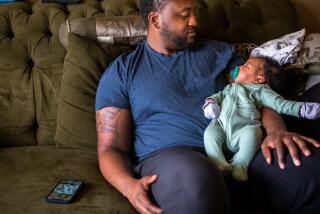Single moms are the most sleep-deprived people in America, report says
Who are the most sleep-deprived people in America? Federal researchers say the answer is clear: single mothers.
A new report from the Centers for Disease Control and Prevention finds that 44% of single moms living with children under the age of 18 fall short of recommendations to get at least seven hours of shut-eye each night.
Single dads who live with their kids fare a little better – 38% of them sleep less than seven hours per night.
See the most-read stories in Science this hour >>
Overall, single parents had the worst odds of getting a good night’s sleep. But couples with children in their homes also suffered in the sleep department – 33% of them slept less than seven hours per night, compared with 31% of adults who didn’t live with kids. That difference, while small, was statistically significant.
Though single moms were more sleep-deprived than single dads, the reverse was true for moms and dads living with their nuclear families. The report found that 34% of these dads got less than seven hours of slumber, compared with 31% of moms. This small difference was also statistically significant.
Single parents also had the most trouble falling asleep and staying asleep, according to the report. Researchers found that 24% of single moms and 17% of single dads said they had trouble falling asleep at least four times a week. That compares with 14% of moms and 10% of dads who live together.
In addition, 28% of single moms and 19% of single dads had trouble staying asleep four or more times a week. They were joined by 21% of moms and 13% of dads who lived with their partners.
However, couples living with children were better off in these respects than adults without kids in their homes. According to the report, 19% of these women had trouble falling asleep and 24% of them had trouble staying asleep at least four times a week. For men, 13% had trouble falling asleep and 18% had trouble staying asleep at least four times a week.
In each type of family, women were more likely than men to report difficulty falling and staying asleep a majority of the time.
All of this troubled sleep made a difference in the morning. Fully half of single parents living with kids – including 52% of single moms and 40% of single dads – did not feel well rested four or more days a week.
They were followed by adults in two-parent families, with 47% of moms and 38% of dads wishing they could get more sleep at least four times a week.
Men (33%) and women (39%) not living with children were least likely to experience four or more groggy mornings a week.
Join the conversation on Facebook >>
Despite this, adults who didn’t have kids in their homes were the ones most likely to take medicine to help them catch their ZZZZZs. According to the report, 8% of these adults took sleep medications at least four times a week, compared with 7% of single parents and 4% of adults living with their partners and their kids.
U.S. health officials have made a good night’s sleep a national priority. People who are sleep-deprived are at greater risk for heart disease, diabetes and depression. They’re also more likely to be involved in car crashes or workplace accidents, the report authors noted.
A study published last month in the journal PLOS Medicine identified sleep deprivation as a risk factor for premature death.
The new report was published Wednesday by the CDC’s National Center for Health Statistics. The results were based on responses to the National Health Interview Survey, which is conducted by the NCHS.
Follow me on Twitter @LATkarenkaplan and “like” Los Angeles Times Science & Health on Facebook.
MORE FROM SCIENCE
It’s official: Four super-heavy elements to be added to the periodic table
Advertising may be fueling the popularity of e-cigarettes among teens, CDC says
Autopsy finds concussion-related brain changes in 25-year-old former football player






